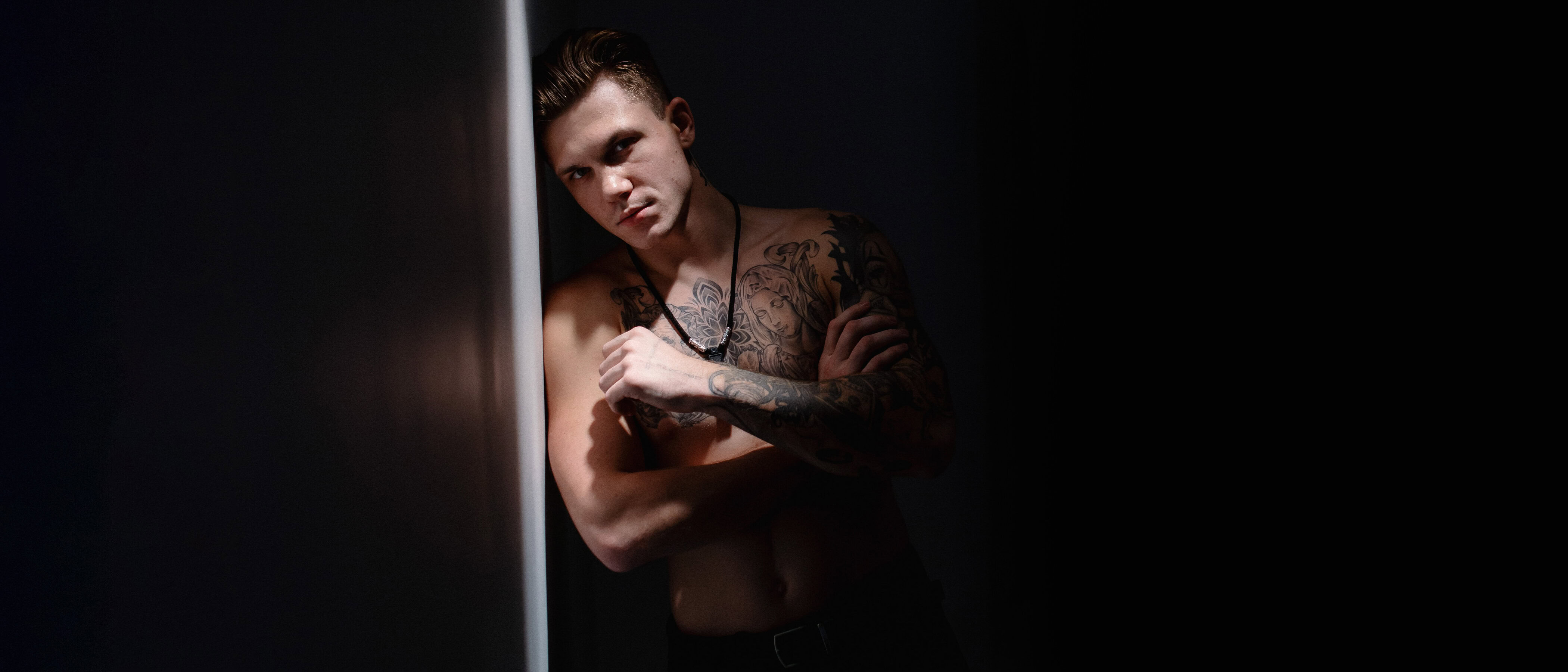

Machine Gunner with Amputation Turns Model at Ukrainian Fashion Week
Veteran Dmytro Tereshchenko, once a promising young boxer, is now a model at Ukrainian Fashion Week. After being injured in Luhansk and losing a leg, the former soldier first devoted himself to swimming, and later, due to insufficient funding for veteran sports, became interested in modeling. Today, he takes part in photoshoots and walks the runway showcasing clothing from Ukrainian designers. His ultimate goal is to become part of the global fashion industry. In an interview with Frontliner, the veteran spoke about life after service, embracing his new body, and finding his new path.
Dmytro enters the studio – greeting everyone, removing his jacket, stepping into frame, and waiting for the photographer’s instructions. Dressed entirely in black, he forms a visually striking contrast against the white room. The prosthetic on his right leg shows beneath his pants – but it doesn’t hinder his mobility; he moves with confidence and ease. This isn’t his first shoot; he has been modeling for over two years.
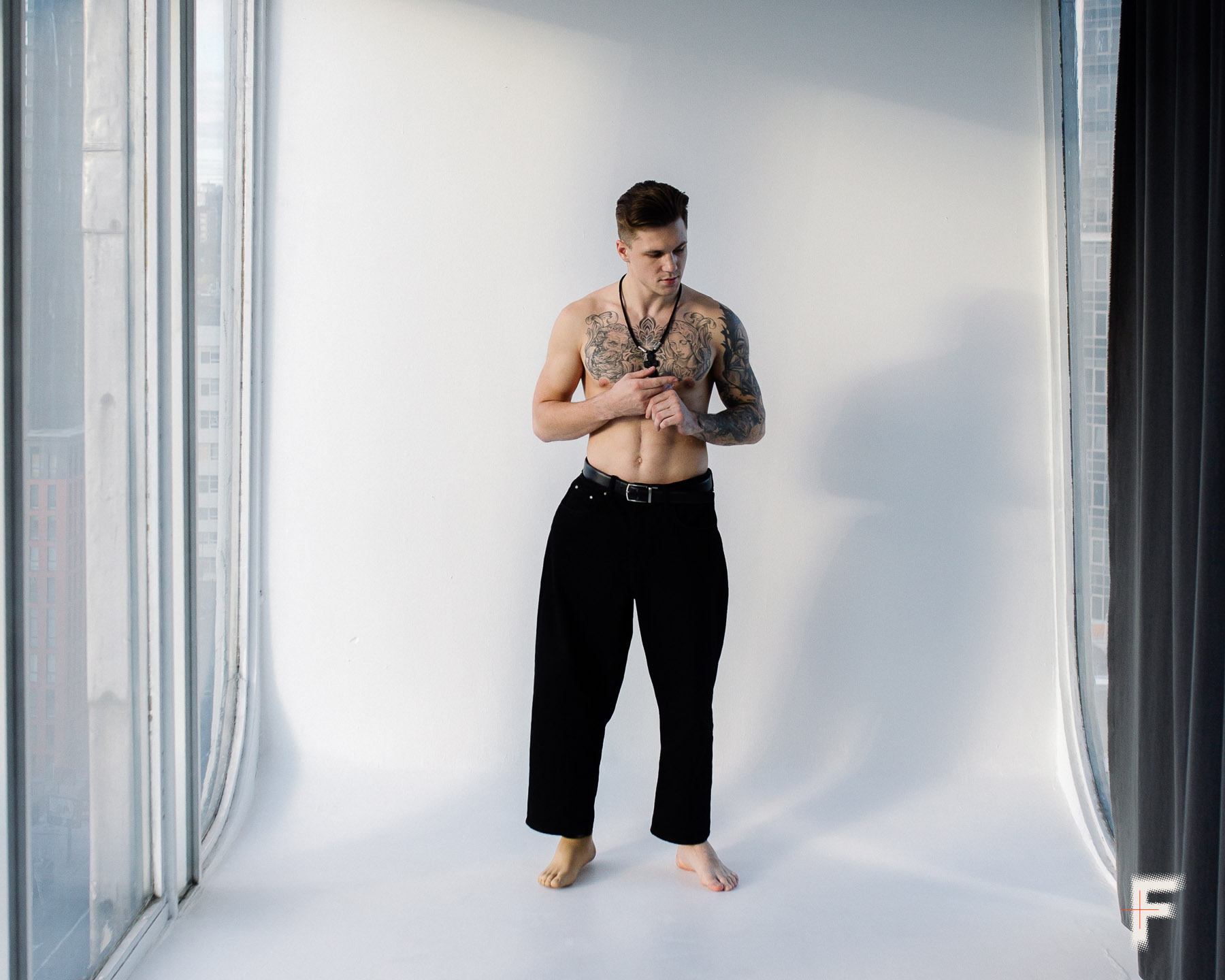

In conversation, Dmytro is reserved. But when the topic turns to injustice, his voice reveals anger, indignation, and disbelief. He is 22 years old. He is a veteran of the Ukrainian-Russian war.
On February 24, 2022, he went to the military enlistment office. They did not accept him, citing his age – he was only 18. But it didn’t deter him: two days later, he joined the Territorial Defense in his native Chernihiv region. Boxing since childhood and a fascination with weapons turned into real military experience: defending Chernihiv, guarding the border with Belarus, and serving in Donetsk and Luhansk. His service ended in Horlivka: an enemy drone, a severe injury, ten hours with a tourniquet. Amputation in Kramatorsk. Prosthetics in the United States.
Meanwhile, there was another kind of wound: bureaucracy. His unit listed Dmytro as ‘absent without leave,’ which canceled all payments due to him. The court case has been ongoing for two years now. He is still awaiting his back pay and the compensation he is owed.
Dmytro is 22 now, and he is officially retired.
Frontliner: Are you currently involved in any military activity? What are you doing now?
Dmytro Tereshchenko: I’m retired. It’s a happy retirement. Mostly I work on commercial shoots now and do sports – for my mental and physical well-being.
Frontliner: How did you get into modeling?
Dmytro: It all started in the United States while I was getting fitted for my prosthetic. There was a photoshoot for a foundation, and the photographer said,
You look very strong on camera.
You should keep going.
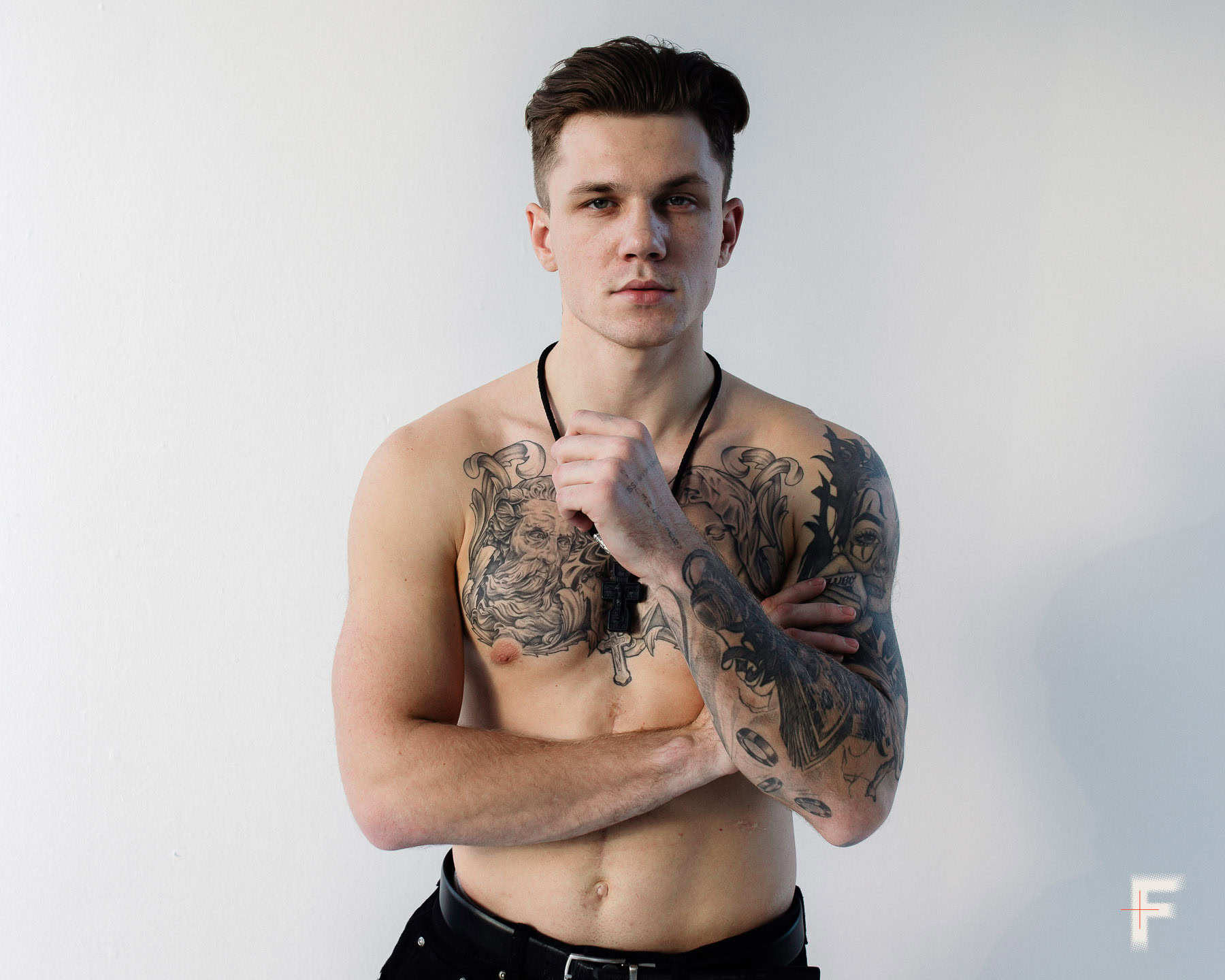

I felt it, and I decided to move in that direction. I returned to Ukraine, put together a portfolio, and began sending it to agencies.
At first, sports took up all my time – training, camps, flights. But starting in 2024 I’ve been actively modeling, taking part in photoshoots and fashion weeks.
Frontliner: Do you get a lot of offers?
Dmytro: I wouldn’t say a lot. I mostly look for opportunities myself. But once I started participating in fashion weeks, people began seeing me not just as a veteran, but as a fashion week model, a model of the year.
Then, in September 2024, the Revived Soldiers Ukraine foundation, which had supported my prosthetics in the U.S., collaborated with designer Andreas Moskin. They created the first adaptive clothing collection and invited me to take part. That’s how it all started.
[Translator’s note: Adaptive clothing refers to clothing designed specifically for people with disabilities or physical differences, making it easier to put on, take off, or wear comfortably.]
Frontliner: How did you feel the first time you stepped onto the runway?
Dmytro: Relaxed, simply relaxed. I felt excitement. I knew this was for me, this was the path I wanted to follow. I realized it was another step toward my goal.
I want to show not just the clothes, but myself, first and foremost.
To position myself as a brand, as a top model.
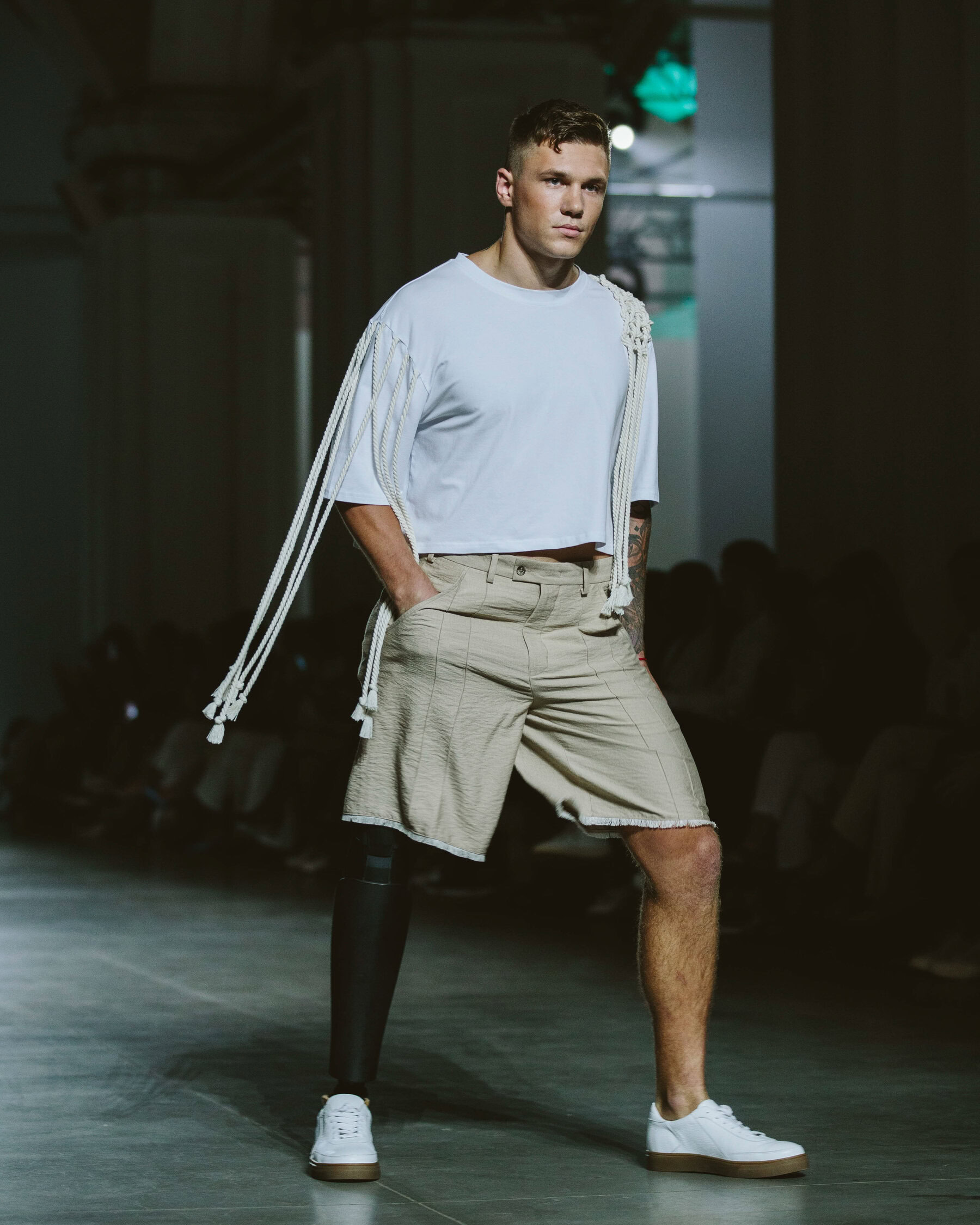

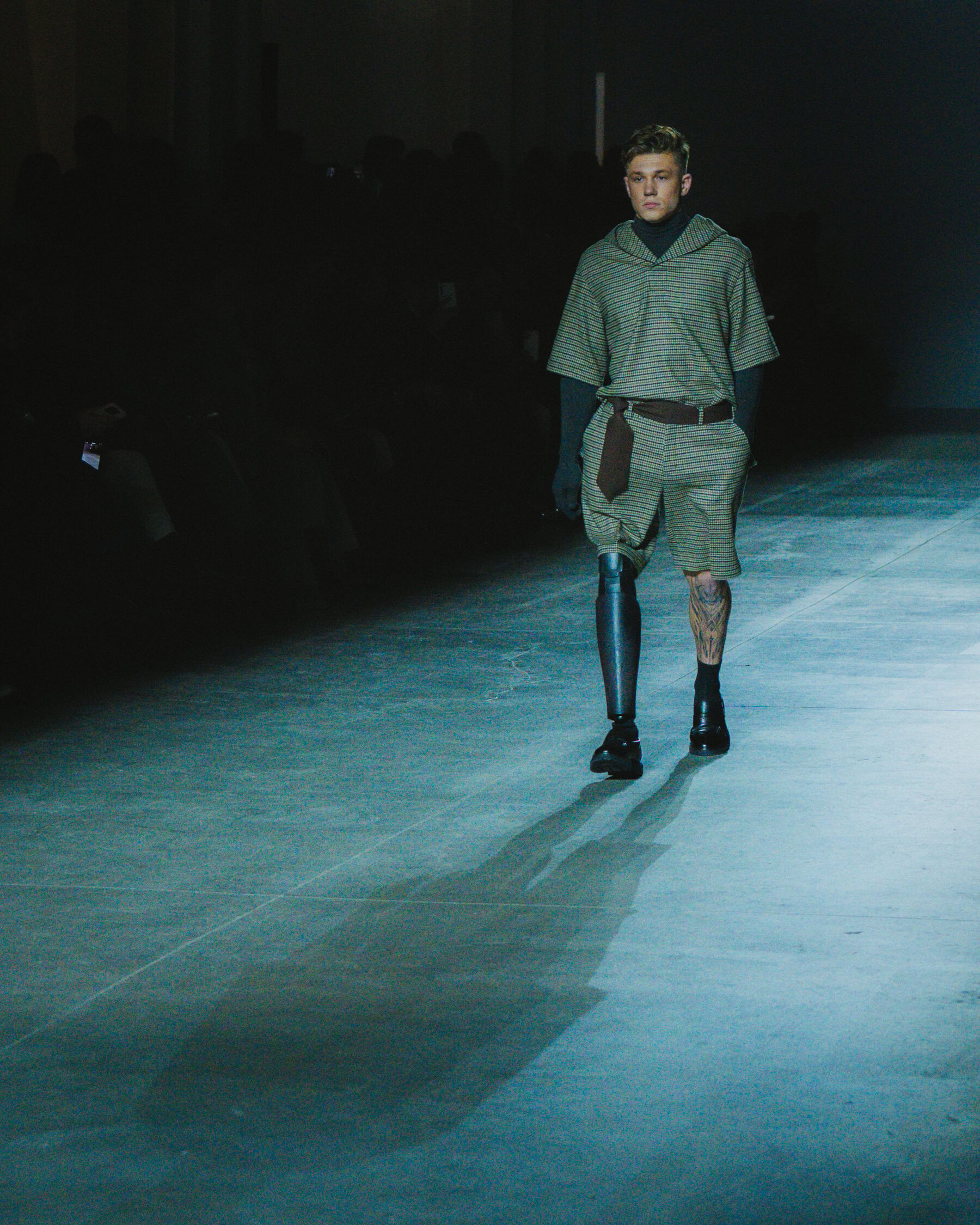

Frontliner: Is it more important for you to promote yourself as an individual in modeling, or to embody the idea that a person with an amputation can also be a model?
Dmytro: That’s a good question. I think, first and foremost, it’s about my personal ambitions as a model. But considering the prosthetic and the disability – it’s also a big step toward integration into society, something that is still very much lacking in Ukraine.
It’s also a way to show what’s happening in Ukraine, who we are, and what we go through.
Frontliner: Are there any rules for how you should walk on the runway?
Dmytro: For some, yes – for me, no. What rules could there be for a person without a leg? We barely walk as it is.
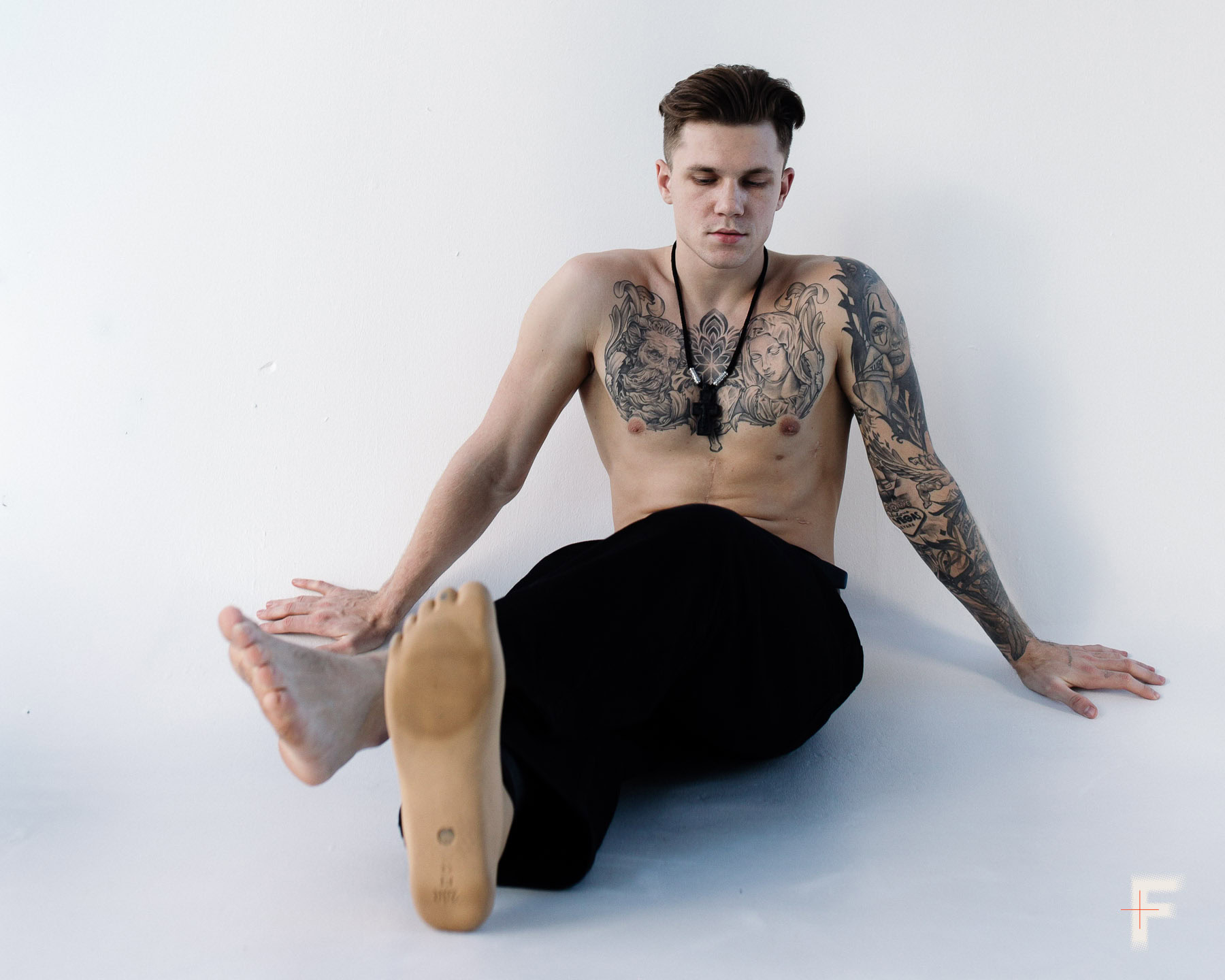

Frontliner: From your experience, is it possible to work as a model in Ukraine now, to have consistent jobs and earn good compensation?
Dmytro: Right now – no. There’s a war. People have little money, and we all understand that purchasing power gradually diminishes. These projects need sponsorship, and those with financial means often overlook this niche.
Frontliner: Still, during the war there has been something of a boom in popularity for Ukrainian brands. They organize big promotional campaigns, but we rarely see people with amputations in them. Why do you think that is?
Dmytro: Because not every client wants someone with a disability in their campaign. And not every person with a disability can perform professionally in front of the camera. If you look at fashion weeks, designer Andreas Moskin was the first to put models with prosthetics on the runway. Only after that did other designers start to follow.
I can’t say there’s real demand for this – it’s more for show, to show that they involve veterans and care about them. I’ve been working for a long time and have many commercial projects, so I can evaluate them. When a job is offered, I review the workload, what’s expected of me, what I can give, and what they can offer in return. When they propose tiny fees and bad conditions – and don’t even reimburse taxi fare, knowing I have to travel across the city – it’s, to put it mildly, not cool.
Frontliner: Have you tried reaching out to international agencies?
Dmytro: I’ve tried, but haven’t heard back yet. Right now, I’m in touch with a photographer who has connections at GQ. I want to go to Los Angeles – that’s where I need to be.
I want to connect with international agencies, get into the “inspiration” category, and show that models with disabilities can work at the top level with top brands and share that with the whole world.
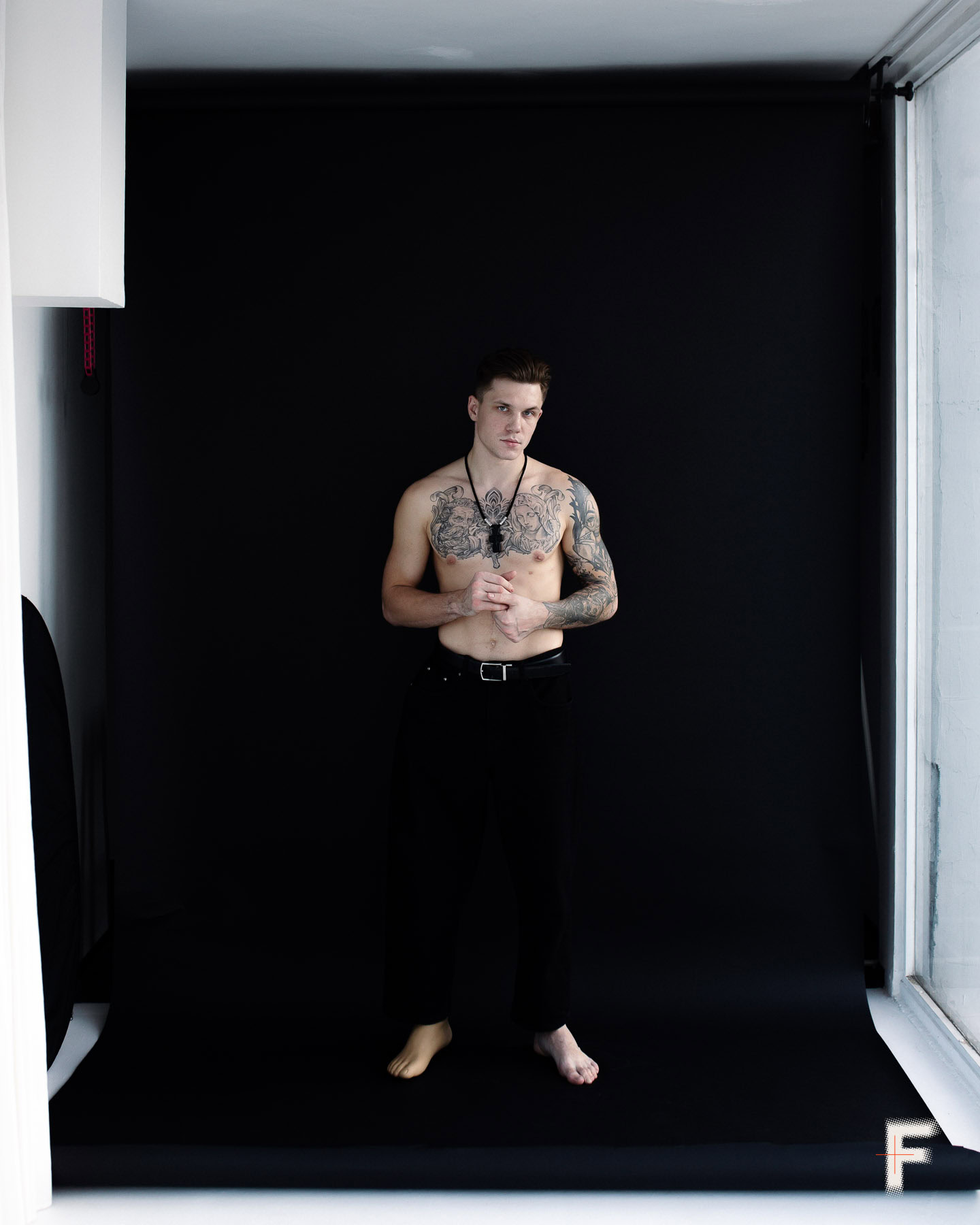

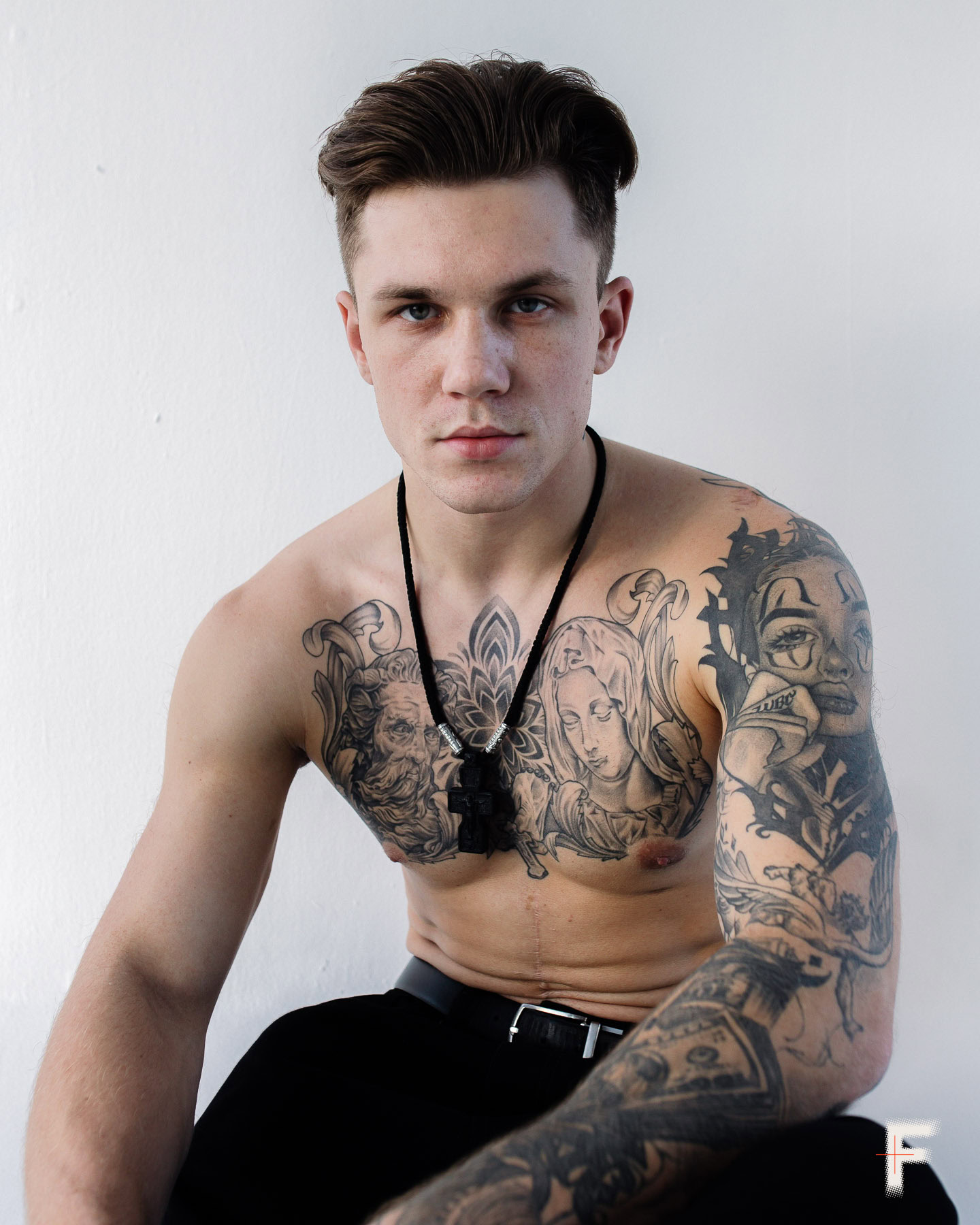

Frontliner: Did you have any ambitions in modeling before the full-scale war?
Dmytro: Not at all. I was completely focused on sports, totally dedicated to boxing. Boxing was my whole life, my plans for the future.
Before the full-scale invasion, I saw myself as a professional boxer.
Frontliner: After you were wounded, did you ever regret joining the military? After all, your whole life was connected to boxing.
Dmytro: I didn’t regret it. I cried a little, of course, I’m not without feelings. I sent a short video to my friends, called my mom. That was it.
I was just happy I wasn’t there anymore, because I wanted to live. I didn’t believe I would survive. In terms of feelings, my rhythm of life has changed a lot because of this. Every day I learn something new. I feel things differently.
But I absolutely don’t regret anything. This whole journey has a purpose. Higher powers are guiding me, and everything works out. Life was given to me for a reason. It wasn’t given to me for no reason – I know that.
Frontliner: Did you want to, or have the opportunity, to return to sports?
Dmytro: After my amputation, I started swimming. I still swim now, but not competitively because there’s no real recognition for what we do. I competed in the Air Force Trials.
In 2024, I represented the Ukrainian national team,
and I won seven gold medals.
At the time, I represented the Chernihiv region, and the Chernihiv Department of Family, Youth, and Sports publicly claimed in the media that they provide all veterans with support and compensate them for international awards. In reality, they told me there was no money, and they couldn’t provide anything.
So, I’m not really motivated to spend my energy and time on it when I could focus on something else. I used to dream about the 2028 Paralympics, but not anymore. To get there, you have to train professionally, fully dedicate yourself, give it your all. For what? To be dropped somewhere along the way. All of this requires money. And nothing is reimbursed. Why? Because the funds don’t go where they’re needed.
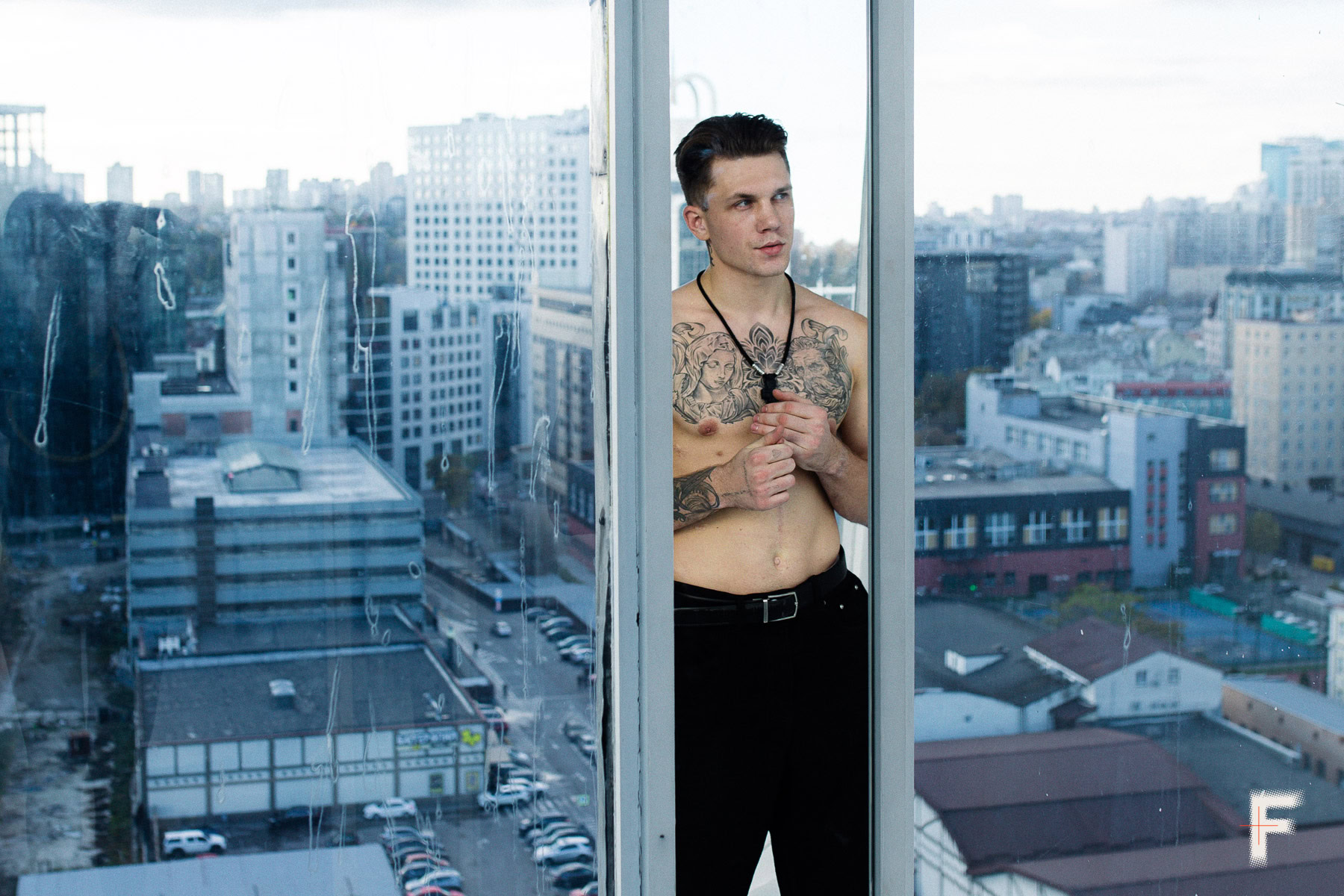

Frontliner: Besides sports and modeling, what else do you do in retirement?
Dmytro: I work in the media sphere. My team and I are building a big project. No announcements yet, but soon everything will be revealed, and it’s going to be huge.
Frontliner: As a veteran with an amputation who has been in the United States, how would you describe society’s attitude toward you in Ukraine and the USA?
Dmytro: In the United States, it’s valued. For them, a veteran represents excellence. Your other achievements don’t matter – a veteran is, first and foremost, respected and appreciated. There’s always loyalty and support.
Here, it’s more about pity. Many people live in their own world. It’s normal to have your own problems and deal with them in your own way, especially considering the times we live in. But, for example, if you see someone with a prosthetic or a disability, don’t pity them. Show respect, and first and foremost, ask how you can help. Look around: maybe you can give up your seat on public transport, offer assistance, instead of just pushing past them.
If someone tells you “no,” take it simply as “no.” Not as a harsh or mean-spirited rejection, it is just a “no.” Nothing more.
For example, sometimes someone offers me a seat on public transport. I say “no” because it’s simply uncomfortable for me. They keep insisting that I should sit. Why the fake kindness if it doesn’t actually help me and just drags both of us into a discussion?
Frontliner: You currently live in Kyiv. How easy is it for you to get around the city?
Dmytro: It depends on the situation and the location. In winter, for example, if the streets aren’t cleared – and they usually aren’t – I hardly go anywhere, only with a crutch. And even then, many places don’t have ramps. You always need to have a reliable handhold.


Frontliner: Do you experience PTSD after being in the war?
Dmytro: Of course. PTSD is one of those things that is always there and it will be. And we need to talk about how hard it is. You have to learn to manage it. You have to get to know yourself. Time alone is meant for discovering your inner world: what you like, what you don’t. Learning to filter your environment as a whole. Understanding what can pull you out of that state, what helps, and what destroys.
Frontliner: Do you keep in touch with your comrades?
Dmytro: Yes, but rarely. Most of them are already gone. The hardest part is realizing that, at 22, funerals have become a regular part of life. It’s really tough.
Frontliner: What’s your take on the reports about mobilization methods at the Military Recruitment Centers? There are claims of people being beaten and even killed.
Dmytro: It’s a messed-up situation. I believe God sees everything, and karma will come for everyone. There are people who do their jobs properly and correctly. But these cases tarnish the reputation of others and the military as a whole.
Frontliner: What’s your view on the other side of the issue – men who refuse to fight, saying they weren’t born for war, or that “we’re more useful here,” in civilian life?
Dmytro: More useful how? Just because they say they’re more useful? I don’t see fundraising being done any faster. I don’t see the economy improving because of them. More useful at what? Going to night clubs? I just don’t get it.
Frontliner: How do you envision Ukraine’s victory?
Dmytro: Without a doubt, Ukraine’s victory means completely uprooting the current system – politically, militarily, and economically. All programs related to veterans and other areas need to be changed or at least updated.
I believe true victory will come when society as a whole changes, both mentally and culturally.
That’s when victory will be real. I live for today. I have people to care for, and I do my part.
I continue to work for victory on my own front, within my own capabilities. But I can’t say exactly what that victory will look like. We all thought in terms of the 1991 borders.
Now our focus is on holding the front so it doesn’t reach territories that were far from the fighting at the start. So far, the situation keeps getting worse and worse. We’ll see what happens next.
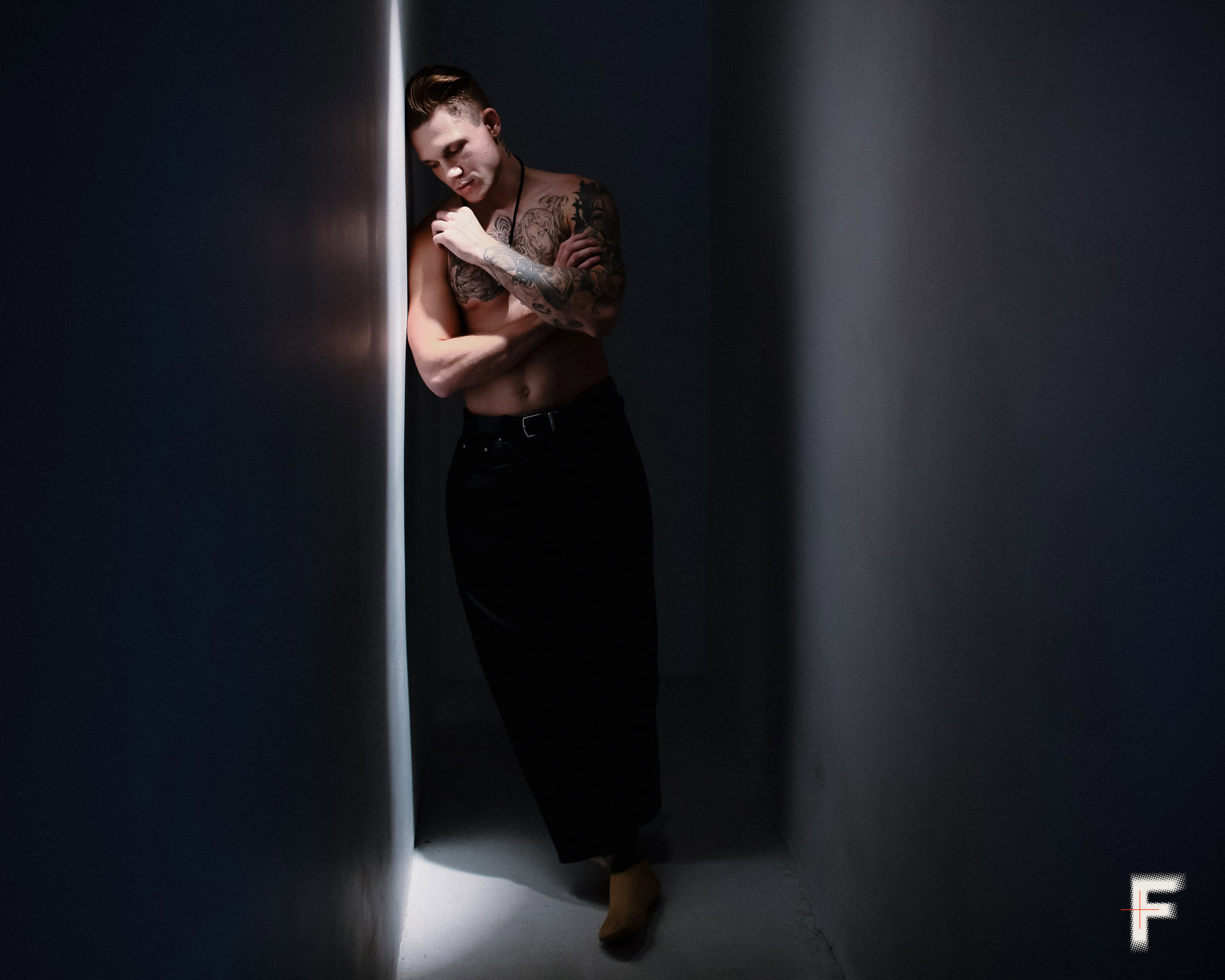

Frontliner: What are your dreams for the future?
Dmytro: Dreams? For my loved ones to be proud of me and simply be happy – and for them to have freedom. Maybe for some people these things sound banal, but for me, they are profoundly meaningful. There’s so much hidden feeling packed into them. Especially into the word freedom.
Frontliner: What is that feeling like for you?
Dmytro: How does it feel? A sense of quiet, calm, and peace. Falling in love with the world around me, with the people who surround me. Gratitude that people around me accept me as I am. Gratitude that they are honest with me. Gratitude that I’ve managed to overcome difficulties. All of this, for me, is freedom.
Frontliner: Is there something you’d like to do after victory? Any particular wish?
Dmytro: No, there isn’t. I’ll definitely be with my fallen comrades, that’s it. I’ll talk to them. Hopefully, in a physical sense, not just in spirit. I’ll visit them at their graves and sit there with them. Smoke.
Text: Tetiana Zabashtanska
Photos: Anna Zubenko
Adapted: Irena Zaburanna
Read more — From discharge to demining: the veterans determined to return to the military service
